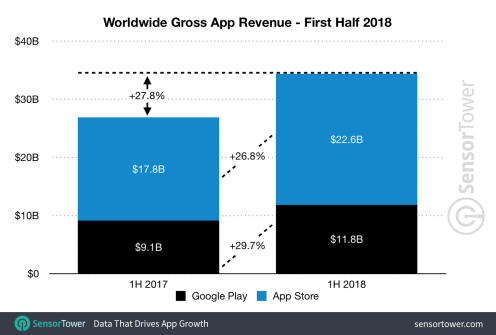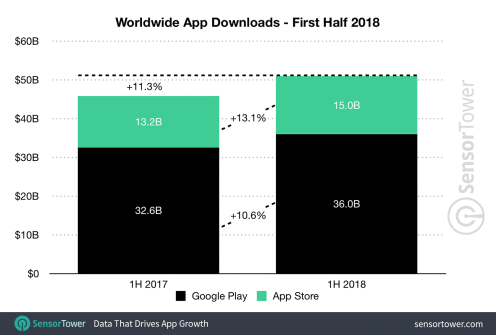 4087
4087
 2018-07-17
2018-07-17

As we move into the second half of 2018, app analytics firm Sensor Tower is out with its data for global app revenue during the first half of the year. As has become the norm, the numbers show just how more revenue Apple’s App Store generates compared to competitors…
According to Sensor Tower, App Store and Google Play users combined to spend $34.4 billion on mobile applications and games during the first half of 2018. That’s an increase of 27. 8 percent compared to the first half of last year, which saw customers spend $26.9 billion.
On a per-platform basis, App Store customers spent an estimated $22.6 billion during the first half of the year, which is nearly double that of Google Play, where customers spent $11.8 billion.
One area where Google Play did have a slight advantage this year was in terms of growth. App Store spending was up 26.8 percent year-over-year, while Google Play spending was up 29.7 percent:
"Consumer spending on Apple’s App Store reached an estimated $22.6 billion worldwide in the first half, which was about 90 percent or 1.9 times more than was spent on Google Play during the first two quarters of this year. Spending on iOS grew 26.8 percent over the same period in 2017, compared to 29.7 percent for Google Play."
One important thing to note here is that the App Store is available in China, whereas Google Play is not.


Google Play also leads in pure first-time app downloads, with users downloading 36 billion applications. Meanwhile, iOS users downloaded 15 billion applications, an increase of 13.1 percent year-over-year.
The ultimate takeaway here, however, is that the App Store earned far and away more revenue than the Play Store, despite accumulating less than half as many app downloads:
"Apple’s platform earned nearly double the revenue of Google’s with fewer than half as many downloads. App downloads grew 13.1 percent versus the same period in 2017 on the App Store, where they totaled 15 billion, a larger increase than the 10.6 percent growth experienced by Google’s platform at 36 billion installs, or more than double iOS."
Source: 9to5mac